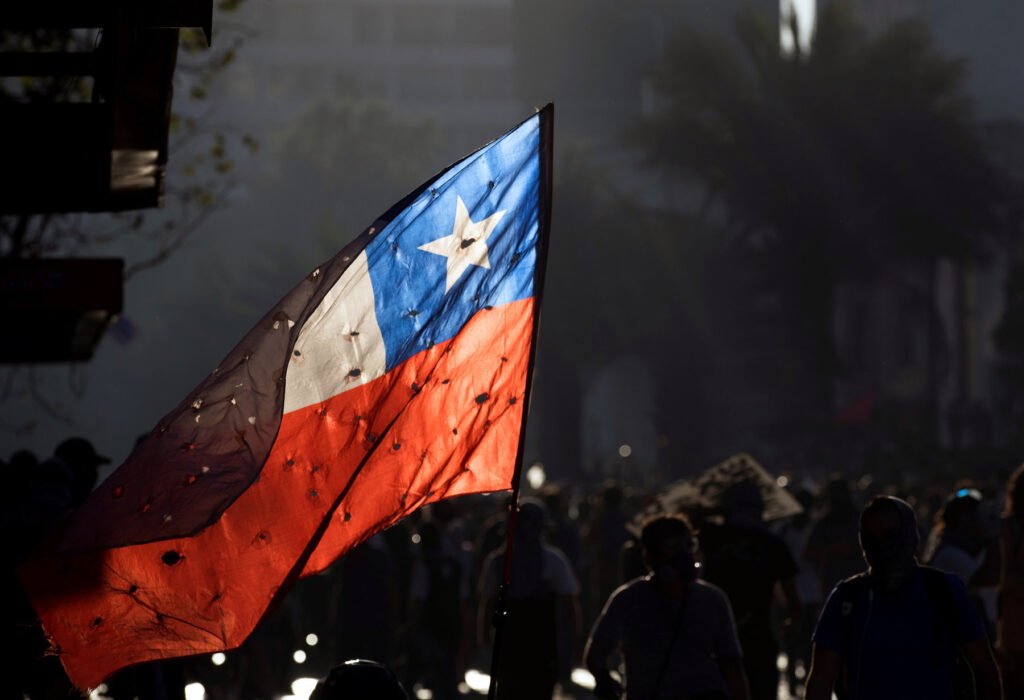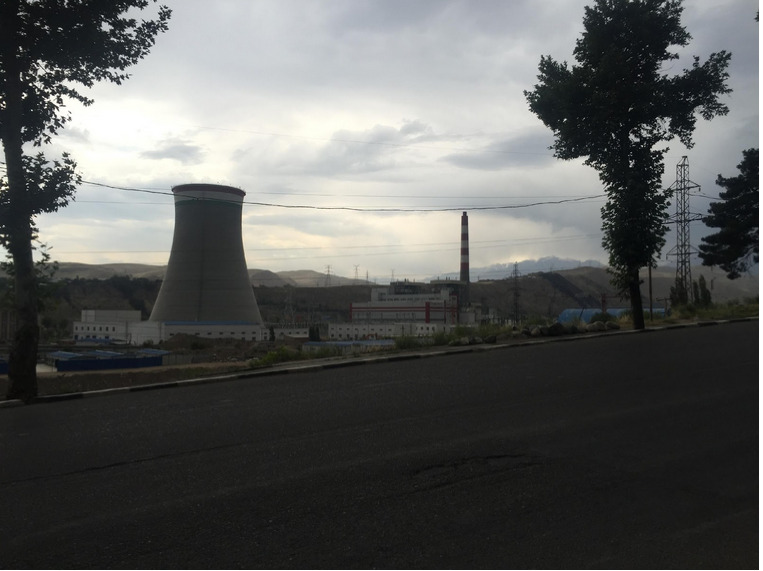Chile is no stranger to governmental oppression and systemic inequality, and Chileans have proven, again and again, their willingness to directly challenge structures of repression. Most famously, Chileans toppled General Augusto Pinochet’s 17-year dictatorship in 1988, rallying under the phrase Chile, ¡la alegría ya viene!, or ‘happiness is coming!’
But 32 years later, many Chileans have yet to taste the promised joys of liberty and prosperity. While Chile has enjoyed a relatively stable economy and a significant amount of international investment compared to its Latin American neighbors, national economic growth has not translated to improved quality of life for the majority of Chileans. In fact, quite the opposite has occurred.
According to United Nations Economic Commission for Latin America, the top 1% in Chile earn nearly a quarter of the nation’s annual income, which leaves a majority of Chileans barely able to eke out a living without accumulating back-breaking amounts of debt. The Central Bank of Chile found that on average nearly three-quarters of household income was directed to paying off debt in 2019.
Monthly pension wages, which comprise 71% of the national GDP, can no longer sustain retirees, forcing citizens to work well past 65 even after decades of making regular payments. By some measurements, the average pension equates to 15% of the recipient’s final wages, a figure that has steadily declined since the nation switched from a public pension system to a private administration in 1981. The purchasing power of the average pension check plummeted during the 2008 recession, leaving millions of retirees receiving significantly less than the national minimum wage, despite paying into their pension plan for years.
Between this malfunctioning pension program and the nation’s flimsy public education system, residents feel trapped in a cycle of hard labor with little hope for upward mobility, and they blame their government for perpetuating this cyclical inequality.
For almost a year, protesters in Chile have been calling on their government to address the economic disparities that have plagued the nation since Pinochet’s dictatorship. Moderate demonstrations last October, which launched in response to a small hike in metro fare, sparked a series of protests that have since engulfed the entire nation. Aggrieved citizens have demanded a redesign of the pension system, education reform and equitable healthcare systems. Protesters will no longer be appeased by incremental reform. They want sweeping, systemic change.
Chileans took to the street in late October of 2019 with so much rage, passion and commitment that the movement earned the title of el estallido, the explosion. Peaceful protests quickly turned into violent clashes between demonstrators and police, leaving 30 dead and thousands wounded. The police’s violent crackdown did little to dissipate protests, which at times attracted as many as 1.2 million people and only began to wane after the onset of COVID-19.
At first, President Piñera brushed off protesters, claiming their destructive tactics rendered their pleas illegitimate. “This desire to destroy everything is not protest, it is crime,” he boldly proclaimed after a week of demonstrations.
Enraged by his dismissal, protesters expressed their fury through burned buildings, toppled streetlights, and sprawling destruction throughout Santiago, the capital. These explosive and sustained protests in Chile, which had been relatively stable for decades, attracted international attention, especially as police violence escalated. The UN issued a 30-page report detailing the torture, abuse and sexual assault committed by police against protesters, which attracted even more outcry from the international community in support of the various protest movements gaining traction in Chile. Piñera eventually acquiesced, agreeing in November of 2019 to hold a constitutional referendum.
After months of organized demonstrations, violent protests, police brutality and extreme political tension, protesters finally see a glimmer of hope for radical change. In a landslide referendum on October 25, Chileans voted to demolish the existing constitution and elect a body of representatives to negotiate its replacement.
According to protesters, the current constitution, which was drafted during Pinochet’s rule, allegedly perpetuates the inequalities and authoritarianism that defined Pinochet’s dictatorship. Pinochet and his supporters touted the document as a champion of free-market principles, the key to economic success. In a plebiscite in 1980, the document received 66% of the popular vote.
However, most Chileans who lived under Pinochet will attest to the climate of oppression, violence and fear that pressured citizens to vote against their interests. Pinochet had already banned political parties, enforced a heavy blanket of censorship and demonstrated his willingness to employ any means necessary — arrest, torture, even murder — to silence dissidence.
Although Chile has been a democracy since 1990, many citizens argue that the current constitution has prevented the full actualization of democratic principles. Jorge Sharp, the mayor of Valparaiso and one of the foremost leftist representatives advocating for protesters, asserts that a document forged out of authoritarianism could never foster true democracy, and that “[r]ewriting the constitution is our chance to lay the foundation for a new society,” a new government that allows for all demographics to exercise their democratic rights.
The binomial legislature that Chile inherited from Pinochet’s government fostered hyper-partisanship, allowing the center-left and center-right parties to become embroiled in their own economic debates and drift further away from the interests of their constituents. Realizing their elected officials would not address their concerns, such as health care reform, voters lost faith in their hard-won democracy and gradually stopped showing up at the polls. Even after replacing the two-party system with proportional representation, Chileans do not feel their voices are heard by the government and claim the interests of the top 1% continue to drown out the struggles of the majority.
For 30 years, the relic of Pinochet’s dictatorship has frustrated working-class Chileans’ endeavors toward upward mobility and, in many cases, attempts to keep their head above water. To international onlookers, 30 additional pesos (about 40 cents in USD) to take the metro may seem inconsequential, a necessary inconvenience for infrastructure upkeep, but for exasperated residents of Santiago, increasing fares signaled that their government remained either ignorant or apathetic of the working-class plight.
Originally scheduled for April of 2020, the referendum was postponed until October. In the intervening months, Chileans have become increasingly frustrated with the systemic inequalities that have characterized the past three decades. In an attempt to keep the national economy afloat, Piñera temporarily stalled all pension funds, which comprise the foundation of Chile’s current economic system. Despite Piñera’s efforts to curb the economic repercussions of the virus, the pandemic has caused a nationwide recession that has exacerbated socioeconomic inequality and food insecurity. Hungry and harried Chileans blame their government for mounting poverty, saying Piñera has provided “band-aids, not concrete solutions.”
In hopes of achieving more concrete solutions to these systemic issues, citizens flocked to the ballot box in October. In a sweeping victory, 78% of voters opted to scrap the Pinochet-era constitution and popularly elect a council of representatives to draft a new governing document.
When the news of the plebiscite’s results broke, tens of thousands of citizens celebrated in Santiago’s Plaza Italia, donning signs saying “Goodbye, General” and “Erasing your legacy will be our legacy.” Floating above the jubilance, neon lights on a nearby tower spelled out “rebirth,” a silent reminder of newfound national hope amidst booming fireworks and resounding cheers.
This referendum marks only the beginning of two long years of elections, negotiations and ongoing political tensions. In April 2021, citizens will vote on a 155-seat constitutional convention, which will consist of half men and half women, and include a mix of legislators and citizens. Constitutional representatives will then have a year to draft new proposals with a two-thirds majority of support.
Although citizens realize the lengthiness and difficulty of this process, they are buzzing with pride for their accomplishments and anticipation for all of the problems they intend to address. After electing representatives to the constitutional convention, discussions among the 155 delegates will likely focus on the rights of the Mapuche indigenous population, alternative strategies for collective bargaining, reevaluating water and land rights, improving privatized healthcare, revamping public education and redesigning pension plans. After drafting a new constitution, citizens will return to the polls and either choose to adopt this new Magna Carta or revert to Pinochet’s constitution. The outlook of a new constitution is still quite uncertain, and there is no consensus about how this representative council should address systemic inequalities. Nevertheless, political factions across the nation have begun to organize to elect representatives into the council. The only thing Chileans can agree on is that this referendum marks the beginning of their hard work toward lasting change.
In the months following the referendum, spokespeople for the protesters have already highlighted impending challenges in rewriting the constitution. Carolina Parraguez Pina, a Chilean constitutional lawyer, has drawn attention to the regulations that impede those without partisan affiliations from running for the constitutional candidacy. One rule requires candidates to acquire 0.4% of their district’s signatures before registering as a candidate, all of which must be on paper. In the time of COVID-19, requiring signatures on paper seems outdated, dangerous and designed to exclude candidates without preexisting funds or organization infrastructure.
Although Pina seeks to provide Chileans with a realistic impression of the challenges and limitations of the constitutional convention, she does not seek to diminish the successes of the referendum. “This new constitution may not be the most avant-garde, nor the most progressive, nor the most inclusive, nor the most beautiful in the world. But at least it will not be out of step with reality,” Pina asserts. A constitution that comes to fruition from the direct efforts of the people is still worth fighting for, she argues, even if it serves merely as the transition toward a more egalitarian and prosperous society.
Since the referendum and the resulting celebrations, demonstrations have subsided. In an effort to curb the spread of COVID-19, Chileans have avoided large gatherings. Like most countries, Chile remains mostly preoccupied with the current public health crisis; however, preparations for the April 2021 election have continued.
Chile’s congress established quotas for the constitutional council, requiring that half of all delegates be female and reserving 23 seats for indigenous representatives. The deadline for registration is January 11. Once the list of candidates has been established, candidates will likely ramp up their campaigns, especially as vaccines for COVID-19 become available.
The road ahead will be fraught with political tension, reluctant compromise and ongoing demonstrations. Chileans still disagree about how their nation should best approach legislative and economic reform, but for the first time since ousting Pinochet in 1988, Chileans made united strides toward sweeping, long-lasting government reform.
Since the protests first began in fall of 2019, 460 protesters have lost an eye in the maelstrom of tear gas and rubber bullets. Although they will never be able to regain their vision, undo the mutilation of their faces, or unlive the trauma of their injuries, many say that this victory has made their loss worthwhile.
Even while suffering from a burst eyeball and a fractured skull, one protester asserts: “I am now conquering my demons, fears and nightmares, because I cannot let impunity win over democracy.”
Ongoing public health threats, financial instability, pressure from the right-wing establishment and internal disputes among protest movements continue to threaten the success of a radically progressive constitution. But Chileans have never yet wavered in their fight for change since protests erupted over a year ago. This referendum, while it marks a change in the trajectory of social and economic reform in Chile, is only the beginning. Happiness again appears on the horizon, but Chileans must remain committed to the struggle to successfully transform this opportunity into lasting change.







